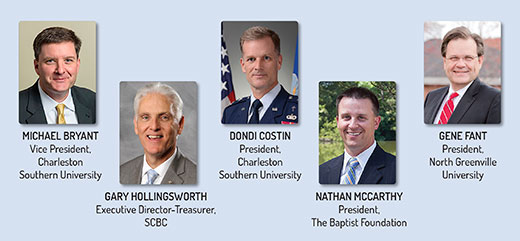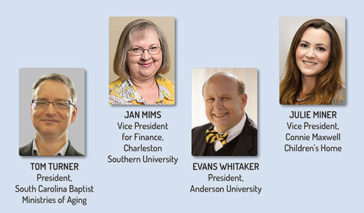With the convergence of a global pandemic, struggling economy, racial tension, protests, recent Supreme Court decisions, a contentious election year, and a growing uneasiness, the question “Where do we go from here?” is on the minds and hearts of many people.
The Courier reached out to our South Carolina Baptist Convention institutional presidents and executives for possible answers to the question.
Gary Hollingsworth, executive director-treasurer of the SCBC, noted, “In my 62 years of life, I cannot remember a time when our nation has been this divided. What is true for our nation seems to also be true for our denomination, and that saddens me greatly. If ever there was a time for us to come together as a unified voice for the hope of the gospel, it should be now. The issues of the pandemic, racial discrimination and economic challenge have been swallowed by political positions and power. Only a heaven-sent national spiritual awakening can bring the change most Christian people desire to see. I am optimistic only because God is still sovereign, and my trust is in Him!”
 Charleston Southern University President Dondi Costin stated, “We began the year as if it was 1974, with an impeachment. We then morphed into 1918, finding ourselves in the midst of a global pandemic. Soon after, it was as if we were living in 1929, on the verge of extreme financial challenges. And before we knew it, we were living in 1968, characterized by social unrest on a national scale. On top of all that, we will witness in these next few months one of the most toxic election seasons in our lifetime. Yet despite all this, God is still sovereign, the world still needs Jesus, and the Spirit of God is on the move.”
Charleston Southern University President Dondi Costin stated, “We began the year as if it was 1974, with an impeachment. We then morphed into 1918, finding ourselves in the midst of a global pandemic. Soon after, it was as if we were living in 1929, on the verge of extreme financial challenges. And before we knew it, we were living in 1968, characterized by social unrest on a national scale. On top of all that, we will witness in these next few months one of the most toxic election seasons in our lifetime. Yet despite all this, God is still sovereign, the world still needs Jesus, and the Spirit of God is on the move.”
The COVID-19 pandemic continues to have a severe impact on our nation and world. At CSU, a Student Emergency Care Fund for students facing dire circumstances was established that has already distributed more than $38,000 to 200 students.
The Baptist Foundation moved quickly to an online giving platform for churches. President Nathan McCarthy said, “It was something that we were planning to offer to our clients but were able to change focus quickly to meet this need. So far, 53 churches have been served through this option.”
Connie Maxwell Vice President Julie Miner said, “One positive outcome from the pandemic is that it has brought compassion to the forefront of our society. Connie Maxwell has taken this opportunity to provide tangible acts of service to the children and families in our care.”
Anderson University graduated 78 registered nurses and nurse practitioners during the pandemic that, according to AU President Evans Whitaker, “has added to the nursing workforce at this critical time in the health of our nation.”
 Tom Turner, president of South Carolina Baptist Ministries of Aging, said, “The pandemic has significantly impacted SCBMA communities with restricted visitation due to the high-risk population that calls Bethea and Martha Franks home. It has been so encouraging to continue to see how our people have rallied to do ‘Christian life’ in a digital world. While quarantined, our residents and staff have continued to pursue corporate prayer.”
Tom Turner, president of South Carolina Baptist Ministries of Aging, said, “The pandemic has significantly impacted SCBMA communities with restricted visitation due to the high-risk population that calls Bethea and Martha Franks home. It has been so encouraging to continue to see how our people have rallied to do ‘Christian life’ in a digital world. While quarantined, our residents and staff have continued to pursue corporate prayer.”
At press time, the number of COVID-19 cases continued to rise in many states — with South Carolina becoming one of the hot spots in the nation. Hand washing, wearing masks, and social distancing have been reemphasized by state officials. Many restaurants and other establishments that had reopened reverted back to pick-up services, and many churches that reopened went back to drive-in services, outdoor services, or continued online streaming of their Sunday services to their congregations.
In the wake of the virus, the Supreme Court ruled in the case of Bostock v. Clayton County that Title VII of the 1964 Civil Rights Act protects employees against discrimination regardless of sexual orientation or gender identity. The original act made it illegal for places of public accommodation to discriminate on the basis of sex, race, color, religion, and national origin. Even the Supreme Court itself agreed the term “sex” in 1964 would have meant male or female. Congress had tried unsuccessfully several times to amend Title VII but was unable to get the votes to pass it. So, according to dissenting Justice Samuel Alito, this 6-3 “preposterous and breathtaking” ruling has effectively created a law that the law-making body of the United States failed to do. The Court, he surmised, moved from judging to legislating.
Many Christians, churches, and Christian institutions could be affected by this ruling, and religious liberty could also be in jeopardy.
According to CSU Vice President Michael Bryant, “As a faith-based institution, the university will still be allowed to follow its biblical convictions and conscience due to protections inside Title VII, as well as the ministerial exception, and the Religious Freedom Restoration Act. Those two pieces of legislation seem to favor a religious institution’s right to hire teachers who align with its beliefs and prohibits the government from substantially burdening the exercise of religion.” He added that CSU will constantly return to the question, “How can our institution exemplify a distinctively Christian identity in a distinctively post-Christian and, at times, anti-Christian age?”
Still, the ruling leaves more questions than it answers. Alito, who was joined by Justice Clarence Thomas, wrote, “The entire Federal Judiciary will be mired for years in disputes about the reach of the Court’s reasoning. The position that the Court now adopts will threaten freedom of religion, freedom of speech, and personal privacy and safety.”
SCBC’s Hollingsworth stated, “The ruling certainly opens wide the door to infringe on religious liberty. Time will tell, and, unfortunately, it will take lawsuits and lots of legal fees to test the impact this decision will have. I expect those challenges to begin sooner, not later. I anticipate the culture moving from apathy toward religious matters to hostility as this ruling begins its climb through the courts.”
Evans Whitaker, president of Anderson University, said, “I was encouraged by two decisions that the Supreme Court issued in early July focusing on religious liberty. Justice Alito affirmed religious institutions’ constitutional right to independence, specifically to make employment decisions in support of its religious mission. We will continue to hire staff who are committed to the Christian faith and respectful of our Baptist identity.”
North Greenville University President Gene Fant stated, “While the ruling is troubling on a number of levels, as a ministry partner of the SCBC, we do not foresee any consequences for our institution in the near future.” When asked if religious liberty is in jeopardy, he responded, “Once we as a nation begin to change the definitions of terms that are essential to culture itself — terms such as female, male, and family terms associated with gender such as mother and father — we have undermined not only religious liberties but all liberties. Freedom is undermined because truth itself is banned from rational consideration.”
CSU’s Bryant cited some possible consequences of the ruling “that could be quite grave, such as loss of federal funding or loss of accreditation for specific academic programs. Institutions could also lose their tax-exempt status.”
Turner added, “Hiring compassionate, qualified individuals who value our Christian mission continues to be one of the highest priorities for SCBMA and its communities. It is paramount.”
None of the ministry partner heads saw racism on campus or in their ministry, but all stated a commitment to be sensitive to racial issues and to treat all people fairly and without discrimination.
According to Associated Press writer Christopher Rugaber, “(The) U.S. economy is stumbling as the viral outbreak intensifies, threatening to slow hiring and deepening the uncertainty for employees, consumers and companies across the country.” He noted that some economists warned about a double-dip type of recession where the economy could shrink again after rebounding.
The institutional leaders The Courier interviewed did not anticipate financial setbacks. Fant said NGU was “cautiously optimistic about the 2020-2021 budget” because of very conservative budgeting. He indicated they expected the enrollment to be flat for the coming academic year.
Whitaker stated that AU had a “measured approach to an already fiscally conservative budget.” He anticipated no budget cuts and a projected enrollment increase for the 2020-2021 year.
Jan Mims, vice president for finance at CSU, stated that in financially troubling times, the unanticipated expenses associated with COVID-19 could be substantial. CSU’s projections for the coming year were outpacing last year’s enrollment.
All the educational institutional leaders emphasized that adjustments would likely need to be made if students could not be back on campus in the fall. All are planning on students being able to return to campus in August.
In the midst of a tsunami of events, “Where do we go from here?” may not be the most effective question. “How do we go from here?” may be more applicable. The answer is certainly simpler. We go forward in faith, not knowing the details of the future, but trusting our God, who holds the future in His omnipotent hands.

